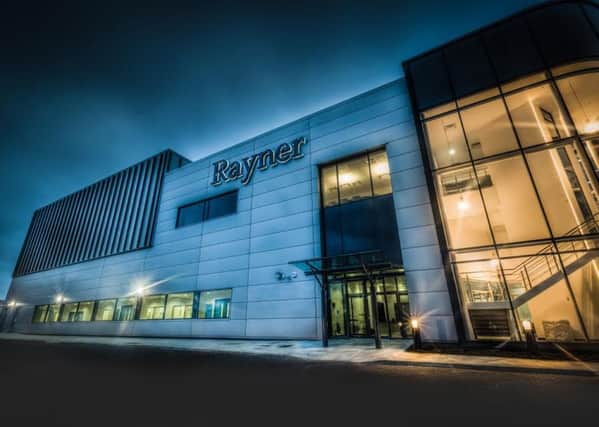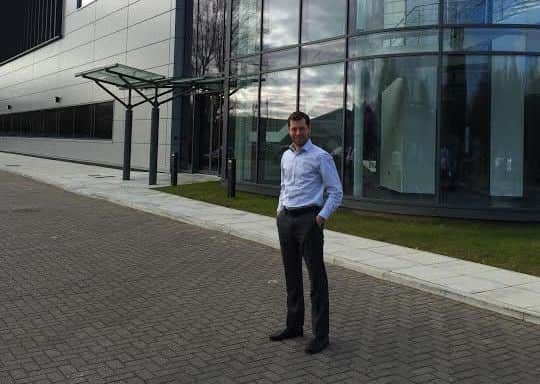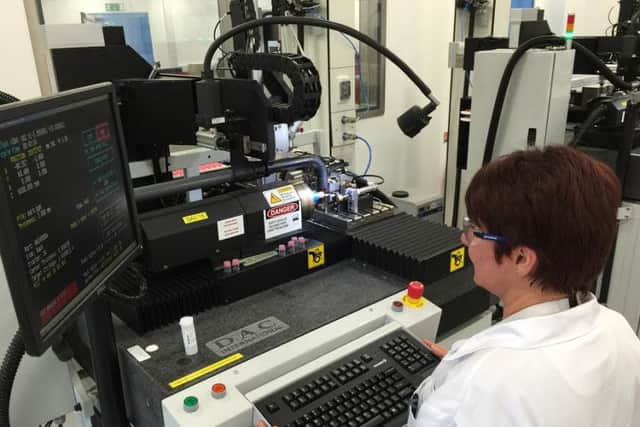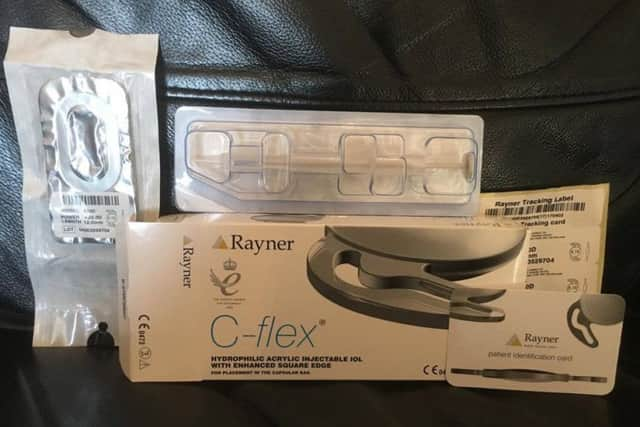Millions of life-changing lenses to be made at £20m Worthing facility


Rayner is transferring staff from its old base in Hove to its new home in Dominion Way, East Worthing, as part of grand plans for expansion.
Its move could more than quadruple production of the special intraocular lenses (IOL), helping patients in over 80 countries see clearer.
Advertisement
Hide AdAdvertisement
Hide AdIn an exclusive interview with the Herald, chief financial officer Darren Millington said: “It is a fascinating industry. We will all get cataracts if we live long enough. For us, the move to this facility was to keep manufacturing in the UK and continue making innovations to help surgeons and patients.”


Rayner was founded in 1910, initially as an opticians, opening branches around the country.
In 1949, Sir Harold Ridley, who had been a Rayner customer as a schoolboy, developed the first intraocular lense and chose the firm to manufacture it.
That year, the first operation to implant the lenses was successfully performed. It is now the world’s most common surgical procedure.
Advertisement
Hide AdAdvertisement
Hide AdSir Harold’s experiences as a military surgeon proved key in the innovation.


He noticed when World War II pilots were injured by fragments from windscreens shattered by gunfire, those with plastic fragments in their eyes, compared to glass, had fewer complications.
The discovery is commemorated in the boardroom of Rayner’s new home, with a painting of a WWII pilot under attack reminding employees of the firm’s heritage.
The new building is also named the Ridley Innovation Centre in his honour.
Advertisement
Hide AdAdvertisement
Hide AdRayner sold the optician side of the business in 2014 and now solely concentrates on producing the lenses and associated products.


It is among the top ten worldwide IOL manufacturers, with annual revenues of £23million and 200 employees.
Despite this, Mr Millington admitted few locally would have heard of Rayner. He said: “We hear a lot of people say we are one of ophthalmology’s best-kept secrets.
“If you ask people if they have heard of us most people would have no idea. We have been quiet about our success and want to bang the drum more for what we do.”
Advertisement
Hide AdAdvertisement
Hide AdThe new Worthing base could increase production of IOLS from 700,000 a year to three million.


With extra space, the firm hopes to double revenues within three years, increasing its share of the £3.5billion market, which is growing by around seven per cent annually.
It also plans to launch 11 new products in the next two years, despite missing out on a Regional Growth Fund grant last year, which would have further improved research and development.
On the relocation, Mr Millington said: “We liked the idea of being near a cluster of tech companies like GSK.
Advertisement
Hide AdAdvertisement
Hide Ad“It is also a nice part of the world. Logistics to Gatwick for travelling are good. The A27 is not brilliant but is more of a problem for staff. We’re very light on logistics.”
He added: “We really want to be a company which stays British and stays in charge of our own destiny, acquiring companies and growing.”
The new base has been designed to aid learning, with a walkway around the ultra-sterile production plant allowing visitors to safely watch the process.


The nature of the product requires them to be made in specially-sealed rooms, with extraordinarily high tolerances meaning around 20 per cent of lenses are thrown away because of tiny imperfections.
Advertisement
Hide AdAdvertisement
Hide AdMr Millington said: “We are planning a programme to get more people interested in engineering, particularly getting girls interested in science, as so many drop out of science. We’re really keen to build those bridges.
“We want to do outreach with residents and potential patients. Worthing has got an older demographic and for them to look around the factory and see what we do will be fascinating.”
The building will be officially opened on Friday, April 8, by Secretary of State for Health, Jeremy Hunt.
Delicate surgery over in minutes
CATARACT surgery was once a painstaking task – but surgical advances mean the procedure is now over in minutes.
Advertisement
Hide AdAdvertisement
Hide AdThe average procedure can now be done in around 12 minutes, completed under local anaesthetic.
The lenses, produced by companies like Rayner, are removed from saline solution and inserted into an injector.
At this moment, the lenses, which measure just a few millimetres across, are extremely soft and bendy, allowing easy insertion.
The lense is injected into the eye through an incision of just two millimetres.
Advertisement
Hide AdAdvertisement
Hide AdAnd while this sounds incredibly precise, chief financial officer Darren Millington said the process could advance further in future.
Rayner will invite medical professionals to the new facility to research improvements.
He said: “It is really exciting. (Something) more useful for patients will be lenses that go through smaller incisions so surgery becomes easier.”
Mr Millington said future improvements could also include pressure sensors within the lenses for glaucoma users, with readings sent direct to the patient’s phone or tablet.
Town a hub for top tech
Advertisement
Hide AdAdvertisement
Hide AdRAYNER’S move to Worthing is evidence the town is ‘open for business’, a senior councillor believes.
Cabinet member for regeneration Bryan Turner said the firm would bring high-value jobs to the area, joining other high-tech firms in East Worthing.
He said: “We are becoming a south coast hub for top-end technology and bio-tech firms – GSK, B&W and ETI are all flourishing, for example, and Rayner’s establishment in East Worthing demonstrates the confidence that they have in the area, and in the local skills base which will be so vital to continued growth.
“Worthing is demonstrably open for business. We have the stability needed for companies to find a firm footing, and have plenty of opportunities for market leaders – or their challengers – to find the workforce and workspace needed to grow.
Advertisement
Hide AdAdvertisement
Hide Ad“We can offer a highly attractive cultural and social scene, which is vital in attracting the very best talent to come and work in the area.”
Rayner chief financial officer Darren Millington said the support from the council and politicians had been a leading factor in the move.
A larger site, with space to expand further if necessary and a lack of sites along the Sussex coast were also factors.
He said: “What swung it from not moving from Sussex was everyone in planning, the council and MPs have been hugely supportive in how they could help. That made everything come together.”